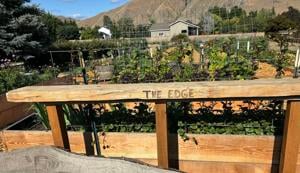In Harry Chapin’s poignant ballad, “Cat’s in the Cradle,” a father reflects on his life’s priorities, realizing too late the consequences of prioritizing the urgent over the truly important. It serves as a timeless reminder that the things we value most may slip away if we don’t intentionally make room for them. Steven Covey echoes this sentiment in his teachings on effectiveness, stressing the need to discern between what is urgent and truly significant to achieve genuine success.
Similarly, Jesus’ teaching in Matthew 6:33 emphasizes the wisdom of prioritizing spiritual values and relationships over material concerns, trusting that when we align our lives with these priorities, everything else falls into place. This call to carve out space for what truly matters — love, compassion, and spiritual growth — starkly contrasts the relentless demands of daily life. Choosing to make room for the important things is not just a decision, it’s a transformative act.

It demands deliberate effort and the ability to resist the constant pull of distractions. It requires creating a life where there is space to nurture connections, pursue passions, and contribute meaningfully to the world around us. This intentional living isn’t merely about survival but about embracing a generous life — a life where our actions reflect our deepest values and priorities.
The biblical principle found in Leviticus 19:9-10 extends this idea of making room for others, urging us to leave the edges of our fields unharvested so that those in need may gather what they require. This ancient wisdom speaks to the virtue of generosity and the importance of creating margins in our lives where unexpected blessings can manifest. Take, for example, the initiative at Avamere at Wenatchee, a retirement/assisted living center on Cherry Street.
Behind this community, a 40-by-100-foot garden thrives, lovingly tended by volunteers dedicated to sharing its bounty with others. Initiated by Gilbert Lutes and supported by neighbors and church friends, this garden, aptly named “The Edge,” produces vegetables and flowers and fosters a spirit of community and generosity. “The Edge” at Avamere is more than a garden; it’s a living testament to the beauty that arises when we intentionally leave space for goodness to grow.
Each plant nurtured in this garden becomes a conduit for sharing and caring, enriching the lives of residents and reaching out to the broader neighborhood. Cultivating this garden mirrors the practice of carving out space in our lives for meaningful moments. Just as the gardeners invest time and effort into cultivating this space, we, too, can create margins in our schedules and hearts for prayer, reflection, and acts of kindness.
In doing so, we invite divine grace to fill these spaces, guiding our actions and infusing our lives with a deeper purpose. The Edge at Avamere exemplifies joy and community, demonstrating how the smallest acts of generosity can produce joy. Whether through gardening, volunteering, or simply setting aside time for conversations with others, we can create spaces where God’s love is tangibly felt and shared.
So, take a moment to visit “The Edge” at Avamere. Witness the beauty and care that volunteers pour into this garden on behalf of the residents. Share a piece of its bounty with others, embodying the spirit of generosity that defines its existence.
In doing so, we honor the wisdom of leaving room for what truly matters, ensuring that our lives are enriched and our communities strengthened by acts of love and compassion. Troy Fitzgerald Wenatchee Seventh-day Adventist Church pastor Troy Fitzgerald is the pastor at the Wenatchee Seventh-day Adventist Church..



















